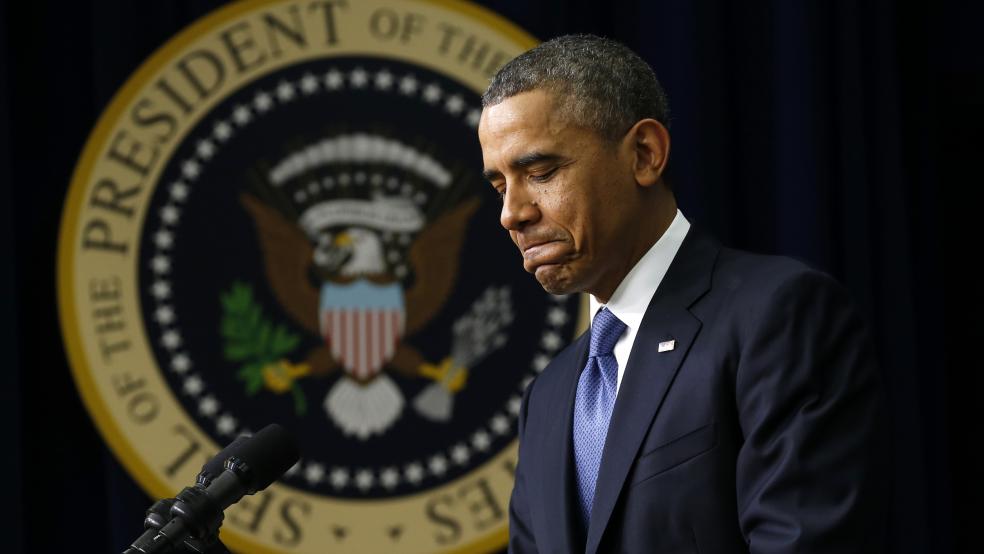President Obama is no Nelson Mandela.
While Mandela famously renounced the politics of revenge in favor of guiding his country towards a prosperous and united future, President Obama has cynically encouraged and stoked resentment among the less fortunate in our country.
Obama’s priorities are different. He wants to exploit politically the hardship suffered by Americans left behind by the forces of modernization and globalization. President Obama has pursued any number of policies that have retarded our recovery – most notably the health care reform bill, which has spurred uncertainty and dampened hiring – but none has been more cynical and damaging than his insistent harangue about income inequality.
RELATED: OBAMA’S RISKY STRATEGY ON CLOSING THE INCOME GAP
Cynical, because his own administration has widened the wealth and income gap through the Fed’s bold (and some say reckless) quantitative easing program; damaging because Mr. Obama presents the yawning divide as evidence of a “stacked deck.” What could be more demoralizing to the nation than hearing from our own president that our cause is hopeless, that the rules are unfair, that our society is, at its essence, corrupt? Unlike Mandela, Obama has raised victimhood to a whole new level. Shame on him.
The facts are clear. In the past several decades, the
Yet, it is arguably the Fed’s quantitative easing program that has accelerated the wealth and income concentration at the top. Moreover, Obama is responsible. Because President Obama put his legacy ambition of universal healthcare – which he knew was controversial - above all the nation’s other needs early in his tenure, he quickly savaged his relations with Congress. As a result, the door closed on bipartisan efforts to reboot the economy.
During the worst recession of our lifetimes, fiscal measures such as infrastructure investment and tax reform were taken off the table, and so we have relied for several years on an untested and possibly dangerous monetary policy. The Fed’s quantitative easing has pushed extra-low interest rates to shore up the housing market, and there has indeed been some improvement in home prices and residential construction. The corollary has been a booming stock market, making Obama’s reviled “fat cats” even fatter.
RELATED: THE FED IS WIDENING THE INCOME GAP AND THAT’S A GOOD THING
The Federal Reserve has just released its tally of U.S. wealth for the most recent quarter, and it is encouraging – the net value of households and non-profits, which includes homes, stocks and all other assets net of debts – was ahead 2.6 percent, a gain of $1.9 trillion. In fact, the country’s wealth hit a record $77 trillion.
The big winners were those owning stocks and mutual funds, whose holdings in aggregate rose $917 billion in the period, compared to a $428 billion gain in home equity. This tilt favors the wealthy, who own financial assets, over those on the bottom half of the ladder, whose largest asset tends to be their home.
Rebuilding the nation’s wealth after the financial crash is an important goal, and progress on that front, though lopsided, is valuable. It leads to rising consumer optimism, and a greater propensity to invest and spend. We are seeing some of that take shape now, with consumers borrowing more on their credit cards, and with mortgage debt rising - up 1 percent in the third quarter, rising for the first time since the downturn. At the same time, consumer credit jumped at an annual rate of 6 percent. Consumer spending, still sluggish, remains all-important to growth, and it is moving higher.
As positive as these readings are, our progress has been anything but satisfactory. The president is right that too many Americans continue to struggle. The unemployment rate has dropped, but as we all know, that is mainly because so many have left the labor force and are no longer looking for work. The number of people with jobs is still 1.3 million below the January 2008 peak; if the recovery had generated new jobs at the average rate of past recessions, 7.3 million more Americans would be working today.
The jobless are not the only Americans in trouble. Not only has Fed easing bolstered the wealth of the top 1 percent, it has crushed the nation’s retirees and others living on fixed incomes. With yields near zero, our seniors have had to choose: invest in riskier assets or see their living standards plummet. When was the last time you heard the president talk about seniors? He dares not go there.
To deflect criticism for his underachieving recovery, the president wants people to get angry - angry at the system, at the GOP, at the wealthy – at anyone but him. That’s why, instead of pledging to work with employers to boost hiring or with investors to create vehicles for new infrastructure, the president suggests that those struggling to get by are somehow victims of discrimination, an un-level playing field, a rigged system. Maybe, they are instead victims of Obama’s failed policies.
Top Reads from The Fiscal Times:






